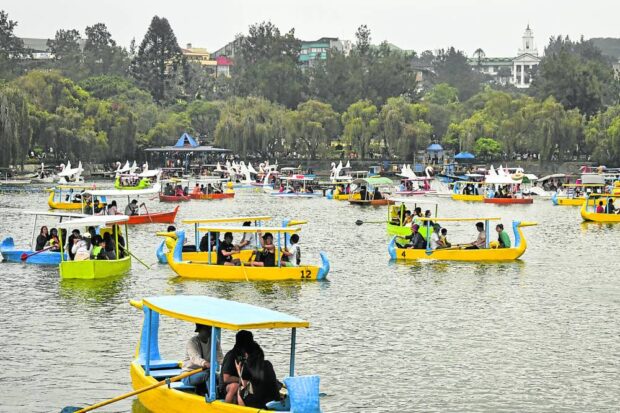
SUMMER DESTINATION | Tourists enjoy a boat ride at Burnham Lake in Baguio City in this photo taken on April 5. The Baguio government acquired a special patent from the Department of Environment and Natural Resources over portions of Burnham Park, including the man-made lake, but it is being contested by the Tourism Infrastructure and Enterprise Zone Authority. (Photo by JETHRO BRYAN ANDRADA / Contributor)
BAGUIO CITY, Benguet, Philippines — Local officials this week began consolidating their proposed changes to the law that replaced the 1909 Baguio City Charter, in order to correct all of its “gross errors.”
These errors are too many that the council may push for the revision of the entire modern charter, or Republic Act No. 11689, instead of simply amending and correcting what they perceived as mistakes in that law, said Councilor Peter Fianza, a lawyer and a former city administrator.
“From our initial assessment, the modern charter has to be revised entirely. There are so many [mistakes], including errors they copied from other laws,” he said during the council’s session on Monday.
Fianza chairs the committee on laws, which is writing a comprehensive position paper on RA 11689 (also called the Revised Charter of the City of Baguio) which lapsed into law on April 11, 2022.
But Councilor Jose Molintas asked the body to also study its legal options, among these a possible petition for declaratory relief before a court “to declare the [Baguio Charter] law inoperative.”
“It has been my position that since the Local Government Code (RA 7160) was established in 1991, we no longer had a charter [as it would have been repealed],” said Molintas, who is also a lawyer.
Using that premise, the city could argue before a court that RA 11689 was void from the start, paving the way for its nullification, he said.
The city council had objected to the modern charter bill last year after its contents were outlined by Secretary Luzverfeda Pascual, presidential adviser on legislative affairs, in their March 7 session.
Nine councilors subsequently passed a resolution urging then-President Rodrigo Duterte to veto the measure, owing to key concerns such as the separation of over 600 hectares of the Camp John Hay reservation from the Baguio townsite, and the absence of Baguio’s territorial boundaries.
Genuine version
Baguio should seek a genuine modern charter from Congress that would resolve modern problems, and that would undergo a plebiscite, the councilors said.
“At no point did we gain anything beneficial from RA 11689 [unlike] the old charter (Act No. 1963 that was penned by Supreme Court Justice George Malcolm),” Fianza said, arguing that a modern charter could have granted Baguio additional powers to solve its current problems.
For example, he said, the new charter could have given the city government sole responsibility over the cutting of pine trees on government, private and corporate lands so it could preserve its natural resources.
Baguio Rep. Marquez Go, who sponsored the law, has filed House Bill (HB) No. 7406 to amend some provisions of RA 11689 that had irked Vice Mayor Faustino Olowan, the council’s presiding officer.
Olowan had earlier complained that Section 23, Article VIII of the law, tasks the city council secretary to transmit all ordinances and resolutions to the Benguet provincial board.
As a highly urbanized city, Baguio is not required to seek provincial board approval for its actions, so that provision effectively downgraded the city’s status to Benguet’s composite city, Olowan said.
HB 7406 removes that provision and also restores an American colonial-era provision in the old charter that allows Baguio to keep revenues earned from the sale of its townsite lands.
Baguio was designed and built by the American colonial government in the early 1900s and is the country’s only remaining townsite reservation where all lands are alienable.
HB 7406 amends Section 50 of the modern charter by stipulating that “proceeds from townsite and miscellaneous sales shall accrue to the city government, a portion of which shall be allocated to [the Department of Environment and Natural Resources (DENR)] for operating expenses.”
A joint committee operated by the Baguio government and the DENR has been processing and approving townsite sales since 1986.
But the committee on laws wants a “closure period” for townsite sales, Fianza said.
“We have been a townsite [reservation] for a century, but look at the number of titles issued by way of townsite sales,” he said, referring to a backlog of townsite sales applications that have not yet been processed.